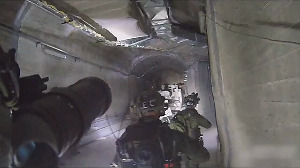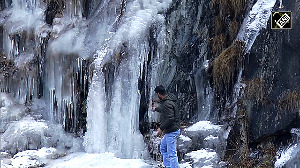Pakistan's intelligence agency Inter State Intelligence continuous to play a role in supporting Taliban insurgency in Afghanistan, leaked intelligence documents have indicated, even as the US continues to route billions of dollars in funds to its key ally in the war against terror.
The leaked documents, titled 'The War Logs', also reveal hundreds of unreported civilian killings by coalition forces in the war-torn country.
These are part of a massive 92,000 documents leaked by web whistleblower site WikiLeaks.
Advance copies were made available to three publications -- The New York Times, British daily newspaper Guardian and German weekly Der Spiegel by WikiLeaks.
The documents suggest that ISI representatives meet directly with the Taliban to support militant groups that fight against American soldiers in Afghanistan and scheme to assassinate Afghan leaders, the New York Times reported.
On June 19, 2006, one document revealed that ISI operatives allegedly met with Taliban leaders in Quetta.
At the meeting, the ISI pushed the Taliban to attack Maruf, a district of Kandahar close to the Pakistani border.
The planned offensive, according to the report, would be carried out by Arabs and Pakistanis.
"While the specifics about the foreign fighters and the ISI are difficult to verify, the Taliban did indeed mount an offensive to seize control in Maruf in 2006," it noted.
American officials, although, have noted that the leaked documents painted a picture that was broadly consistent with other classified intelligence.
Some of the reports among the leaked documents also described Pakistani intelligence working alongside the Al Qaeda to plan attacks but experts warned that directly linking the ISI with the Qaeda was tenuous.
The leaked documents also indicated that ISI officers had made efforts to run the networks of suicide bombers starting from 2006 -- the threat however does not appear to have materialised.
One document described current and former ISI operatives visiting madrassas near Peshawar to recruit new fodder for suicide bombings.
"American intelligence learned that the Haqqani network sent bombers at the ISI's behest to strike Indian officials, development workers and engineers in Afghanistan," the New York Times said.
From July to October 2009, nine threat reports detailed movements by Taliban suicide bombers from Pakistan into populated areas of Afghanistan, including Kandahar, Kunduz and Kabul.
Overall, the documents also underline the frustration that exists in the US when it comes to dealing with Pakistan's double motives in the Afghanistan-Pakistan conflict.
Americans have long suspected the ISI's behind-the-scenes tactics and officials in the Obama and Bush Administration have confronted the spy agency with accusations and proof of complicity.
Washington, however, continues to describe Islamabad as its key ally. Earlier this month, Secretary of State Hillary Clinton announced a package of $500 million as development aid during her visit to Pakistan.
Despite requests by US Congress members for more details of the ties between the ISI and military insurgents, the Pentagon and the CIA provided vague responses, according to the New York Times.
"The burden of proof is on the government of Pakistan and the ISI to show they don't have ongoing contacts," Senator Jack Reed, a Rhode Island Democrat on the Armed Services Committee who visited Pakistan this month, said.
The man who is running the show in Pakistan, the head of the army, General Parvez Ashfaq Kayani, ran the ISI from 2004 to 2007, a period from which many of the reports are drawn, the New York Times pointed out.
The documents also suggested that Lt Gen Hamid Gul, who ran the ISI from 1987 to 1989, is still in cahoots with the militants like Jaluluddin Haqqani and Gulbuddin Hekmatyar who have thousands of fighters in Afghanistan.
One leaked document alleged that in January 2009 Gul attended a meeting with a group of three senior Afghan insurgent commanders and three "older" Arab men, presumably representatives of the Al Qaeda, in South Waziristan's capital Wana.
Gul has already dismissed the allegations against him in the report.
Meanwhile, National Security Advisor James Jones said that WikiLeaks had not contacted the US government before going public and condemned the leak as "irresponsible".
"The United States strongly condemns the disclosure of classified information by individuals and organisations which could put the lives of Americans and our partners at risk, and threaten our national security," Jones said.
The report also had damning information on the US like the existence of a "black" unit of special forces hunts down Taliban leaders for "kill or capture" without trial.
The Guardian pointed out that the documents revealed 144 such incidents where civilians have been killed in previously unknown incidents such as troops shooting unarmed drivers or motorcyclists to protect themselves from attacks.






 © 2025 Rediff.com -
© 2025 Rediff.com -